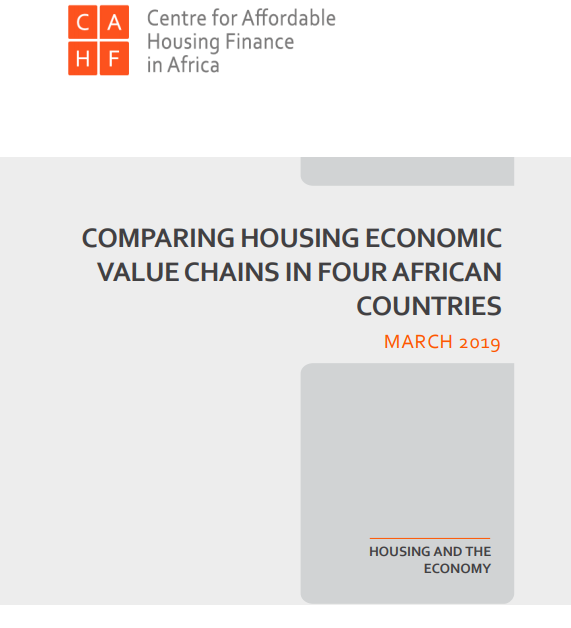Comparing Housing Economic Value Chains in Four African Countries

Understanding how developing economies build housing, and how housing contributes to the growth of developing economies, is a key requirement for implementing evidence-based economic, housing and housing finance policy. Yet, in many developing nations, insufficient macroeconomic and housing sector data exists to quantify how, where and to what extent housing influences economic growth.
This paper outlines the findings from a pioneering methodology developed by CAHF that has been used to describe, quantify and compare the impact of housing on the economies of South Africa, Rwanda, Kenya and Nigeria. This paper analyses the impact that housing construction and housing rental have on developing economies, and which sectors of the national economy are most impacted by these activities. The relative roles of formal and informal housing markets are also considered in the analytical framework. Specific reference is made to the findings for South Africa, Rwanda, Nigeria and Kenya.
An economic value chain framework is used to quantify the direct impact of the construction and rental of housing on the gross domestic product of these countries. The Housing Economic Value Chain (HEVC) analysis quantifies intermediate inputs into housing construction and rental from ‘upstream’ primary, secondary and tertiary economic sectors, and disaggregates this into Standard Industry Classification (SIC) sectors. Further, the value-added components of residential construction and rental (labour remuneration, gross operating surplus and net indirect taxes less subsidies) are quantified.
The HEVC methodology uses the best available economic and socioeconomic data for each country and is adapted through applying proxy data or assumptions where sufficient, accurate data does not yet exist. An important outcome of this study is to illustrate to policy-makers the importance of collating and analysing relevant economic and housing data for diagnostic purposes. The HEVC findings highlight the importance of housing as a contributor to gross fixed capital formation, show its catalytic role as both a secondary and tertiary domestic market stimulant, and illustrate the comparatively high value-added and employment creation potential of housing.
The HEVC methodology also helps to build a shared understanding between economic and housing specialists. The HEVC outcomes can therefore inform the development of more nuanced economic, housing and housing finance policy focused on further stimulating economic growth and housing provision. To date, these HEVC analyses have formed the basis for policy discussions with national treasuries, central banks, human settlements departments, financial intermediaries and private sector financial institutions. At the core of these interactions is the principle that a more efficient housing-economy nexus improves the potential for every household to secure adequate housing whether through formal or informal processes, and that all housing activity ultimately contributes to national economic well-being.
Based on the success of the country studies completed to date, this methodology will be extended to include Cote D’Ivoire in 2019 and is also being applied to analyse the economic impacts of South Africa’s subsidised housing value chain.


Comments